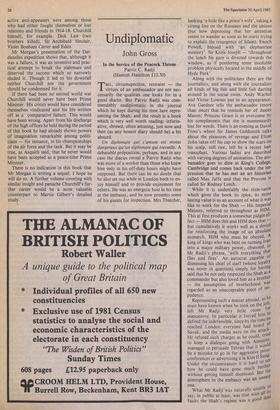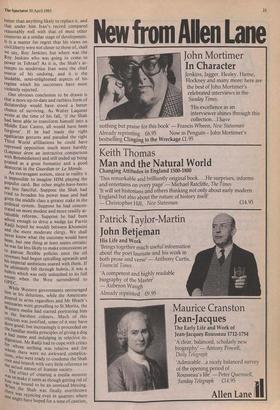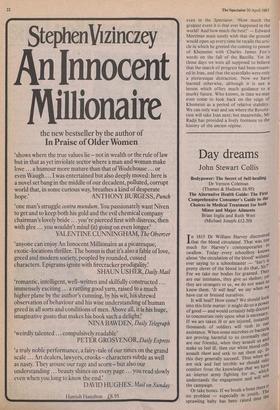Undiplomatic
John Gross
In the Service of the Peacock Throne Parviz C. Radji (Hamish Hamilton £12.50)
Tact, circumspection, restraint — the virtues of an ambassador are not nec- cessarily the qualities one looks for in a good diarist. But Parviz Radji was com- mendably undiplomatic in the journal which he kept during his time here repre- senting the Shah, and the result is a book which is very well worth reading: inform- ative, shrewd, often amusing, just now and then (as any honest diary should be) a bit absurd.
Un diplomate qui s'amuse est moins dangereux qu'un diplomate qui travaille. A debatable proposition, perhaps, and in any case the diaries reveal a Parviz Radji who was more of a worker than those who knew him only in his off-duty hours might have supposed. But there can be no doubt that he also set out while in London both to en- joy himself and to provide enjoyment for others. He was an energetic host in his time at the embassy, and he now presents some of his guests for inspection. Mrs Thatcher,
looking 'a little like a priest's wife', taking a strong line on the Russians and the unions (but how depressing that her attention seems to wander as soon as he starts trying to explain the resurgence of Islam). Enoch Powell, blessed with `an elephantine memory'. Sir Keith Joseph — `throughout the lunch his gaze is directed towards the window, as if pondering some insoluble problem physically located in the middle of Hyde Park'.
Along with the politicians there are the journalists, and along with the journalists all kinds of big fish and little fish darting around in the social swim. Andy Warhol and Victor Lownes 'put in an appearance.
Ava Gardner tells the ambassador (more than once) that he reminds her of James Mason; Princess Grace is so overcome by his compliments that she is momentarily lost for words. There is an evening at David Frost's where Sir James Goldsmith talks about the pleasures of revenge and Elton John takes off his cap to show the scars on his scalp, still raw, left by a recent hair transplant. Various ladies are described
with varying degrees of animation. The am- bassador goes to dine at King's College,
Cambridge and comes back under the im- pression that he has met an art historian called Max Jaffe and that the Provost is called Sir Rodney Leech. While it is undeniably the tittle-tattle which gives the book its spice, its more lasting value is as an account of what it was like to work for the Shah — His Imperial Majesty, referred to throughout as HIM.
This at first produces a somewhat pidgin ef-
fect — HIM does this and HIM does that —. but cumulatively it works well as a device for reinforcing the image of an absolute monarch, HIM who must be obeyed. A king of kings who was bent on turning Iran into a major military power, obsessed, in Mr Radji's phrase, `with everything that flies and fires'. An autocrat capable of dismissing his chief of staff (whose loyalty was never in question) simply for having said that he not only respected the Shah as a commander but also loved him as a brother — the assumption of brotherhood was regarded as an unacceptable piece of im- pudence.
Representing such a master abroad, as he must have known when he took on the job, left Mr Radji very little room f°I. manoeuvre. In particular it forced him to defend the indefensible, since by the time he,. reached London everyone had heard 01 Savak, and the media were on the attack. He refuted such charges as he could, tried to keep a dialogue going with Amnesty, managed to persuade Tehran that it would be a mistake to go in for aggressive Press conferences or advertising a la Kim II Sul: Under the circumstances it is hard to Seer how he could have gone much fti"ti without getting himself dismissed. But the atmosphere in the embassy was an Linea"' one.
What Mr Radji was naturally unable to say, in public at least, was that with all its faults the Shah's regime was a good deal better than anything likely to replace it, and that under him Iran's record compared reasonably well with that of most other Countries at a similar stage of development. It is a matter for regret that his views on civil liberty were not closer to those of, shall we say, Roy Jenkins; but where was the Roy Jenkins who was going to come to Power in Tehran? As it is, the Shah's at- tempts to modernise Iran were the chief source of his undoing, and it is the laudable, semi-enlightened aspects of his regime which his successors have most violently rejected.
One obvious conclusion to be drawn is that a more up-to-date and ruthless form of dictatorship would have stood a better chance of surviving. As Walter Laqueur wrote at the time of his fall, 'if the Shah had been able to transform himself into a Middle East Castro, all would have been forgiven'. If he had made the right egalitarian gestures and paraded the right Third World affiliations he could have repressed opposition much more harshly (Laqueur drew an instructive comparison with Boumedienne) and still ended up being praised as a great humanist and a good democrat in the Guardian or Le Monde.
An extravagant notion, since in reality it is impossible to imagine HIM playing the Populist card. But other might-have-beens are less fanciful. Suppose the Shah had tried to broaden his power base and had given the middle class a greater stake in the Political system. Suppose he had concen- trated on more modest and more readily at- tainable reforms. Suppose he had been adroit enough to drive a wedge (as Parviz Radji hoped he would) between Khomeini and the more moderate clergy. We shall never know what the outcome would have ,neeo, but one thing at least seems certain: Ile was far less likely to make concessions or to Pursue flexible policies once the oil his had begun spiralling upwards and he imperial ambitions soared with them. If tle ultimately fell through hubris, it was a hubris which was only unleashed to its full extent when the West surrendered to °PEC.
b. While Western governments encouraged "Int in his delusions, while the Americans Poured in arms regardless and Mr Heath's emissaries went grovelling to St Moritz, the western media had started portraying him in the harshest colours. Much of this done was justified, some of it may have the good; but increasingly it proceeded on a'e. familiar media principles of giving a dog „Dad name and indulging in selective in- dignation. Mr Radji had to cope with critics whom whom nothing was relative and for _floto there were no awkward complica- tions, who were ready to condemn the Shah the t and branch with very little reference to
actual nature of Iranian society.
_ n_l he effect of creating a media monster ht 0 make it seem as though getting rid of wurih was bound to be an unmixed blessing. when the Shah was finally overthrown there was rejoicing even in quarters where one
might have hoped for a note of caution,
even in the Spectator. 'How much the greatest event it is that ever happened in the world! And how much the best!' — Edward Mortimer must surely wish that the ground would open up every time he recalls the arti- cle in which he greeted the coming to power of Khomeini with Charles James Fox's words on the fall of the Bastille. Yet in those days we were all supposed to believe that the march of progress had been resum- ed in Iran, and that the ayatollahs were only a picturesque distraction. Now we have learned otherwise, although it is not a lesson which offers much guidance to a murky future. Who knows, in time we may even come to look back on the reign of Khomeini as a period of relative stability. We can only wait and see where the Revolu- tion will take Iran next; but meanwhile, Mr Radji has provided a lively footnote to the history of the ancien regime.












































 Previous page
Previous page